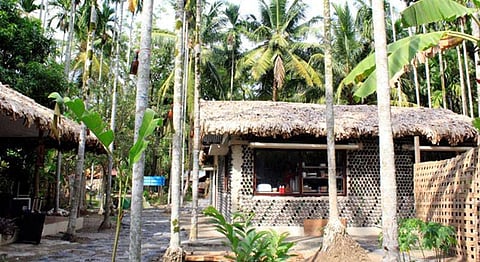
- HOMEGROWN WORLD
- #HGCREATORS
- #HGEXPLORE
- #HGVOICES
- #HGSHOP
- CAREERS
- ABOUT US
- CONTACT US

Vacations are all about luxurious getaways with scenic views an natural beauty. However, what does one do when the very beauty we seek to enjoy begins to diminish thanks to irresponsible tourism. Today, it has become imperative to realise what our irresponsibility, our lifestyle and unaccountability towards nature has done. Commercial tourism resulting in deforestation, excessive construction, littering and rising pollution levels has tremendously affected our eco-systems.
As much as we love to travel, we must recognise the dire need to approach tourism, and development surrounding it, from a sustainable and ethical point of view. One that does not pose a threat to the ecology and the people of the place you plan on visiting. Tourism is a thriving industry and there is no denying that. However, it now requires a two-fold effort –– on behalf of both, the tourists and the local management, and Outback Havelock is doing just that.
Outback Havelock is a boutique eco-friendly establishment co-founded by Zorawar Purohit, Akhil Verma, Aditya Verma
and Rohit Pathak. This one-of-a-kind getaway is situated in Andaman and Nicobar Islands’ hub for scuba diving - Havelock. The property has “200,000 recycled installations” and is constructed majoritarily from recycled waste material.
Homegrown spoke with co-founder Zorawar Purohit to know more about the resort’s unique approach.
HG: What was the inspiration behind starting an environmentally responsible resort?
Purohit: Andaman islands run on diesel powered generators that are subsidised by the government. There is absolutely no plastic recycling in the 580 odd islands that make up Andaman. Garbage treatment is limited to dumping and incineration. So, responsible waste management was a big factor.
However, the biggest inspiration was the level of commercialisation that the islands have been subject to in the mere seven years I’ve been here. I started in 2012 as a diving instructor and continue to teach scuba diving till date. My association with marine life and conservation is extensive. I’m also a marine conservation instructor. So, with scuba diving, seeing the reefs around and diving in a particular destination repeatedly gives you a a very good idea about the increasing amount of plastic. I wasn’t reading about it like most but witnessing it first-hand. So, I was very clear that if I ever start a business here, it should reflect environmental consciousness. That’s how the idea came about.
HG: How did you narrow own on techniques that you would use to execute your plan?
Purohit: We took cues from a French architect’s technology of using plastic bottles as construction material. The material is approximately 10 times stronger than brick and more water resistant and therefore durable. This was ideal for Andaamans considering the climate and weather conditions. For the project, Outback Havelock used half a million plastic bottles from the islands itself and 400 to 500 kilograms of rubber. For an island that is 110 sq. km in area, the amount of waste reused was quite a great achievement.
HG: How Have you integrated sustainability in the overall functioning of Outback Havelock?
Purohit: From a basic level of rain water harvesting and having an organic kitchen garden to building the entire establishment with recycled plastic, we have tried to integrate sustainability every step of the way. The footpaths are made from recycled rubber.
We are also open to any and all locals who wish to come and replicate our model. All locals who have found the model attractive and useful and have come to us with queries and doubts, have been welcomed. We are very happy to share our blueprints and process. The best thing is being able to market this idea in order to increase tourism, thereby encouraging others to adopt a similar approach.
HG: What are the challenges you face during the inception of Outback Havelock?
Purohit: We came across this architectural style on Google so all we had were some videos and basic guidance with respect to reference material. There was no hands on experience as such. So, execution was the most challenging.
Also, the the thing that matters the most when it comes to civil construction is labour. So, to convince laborers to attend workshops and try something they’ve never heard of was a mammoth task. Especially when we are in their territory. It took a lot of convincing.
Also, the pace of construction was slow when compared to the time it takes to construct using conventional methods. Another challenge was to convince other resorts to let us use the waste they generated.
HG: Do you have any plans to expand Outback Havelock in the near future?
Purohit: Yes, we are working on a new project in Port Blair. It will probably launch in 2019. The new project is on the same lines as Outback Havelock, but more inclusive. It won’t be just a cafe and resort but more on the lines of a farm business model, where property is created using waste from the vicinity itself. Also, we plan on inviting local students to contribute and volunteer in whatever capacity, and subsequently get educated about the techniques and their benefits. We hope for them to be means to spread this information far and wide. The longterm goal is not just create a property not just for our benefit but to create a overarching sustainable image for Andamans as a whole.
If you enjoyed reading this article, we suggest you read:
